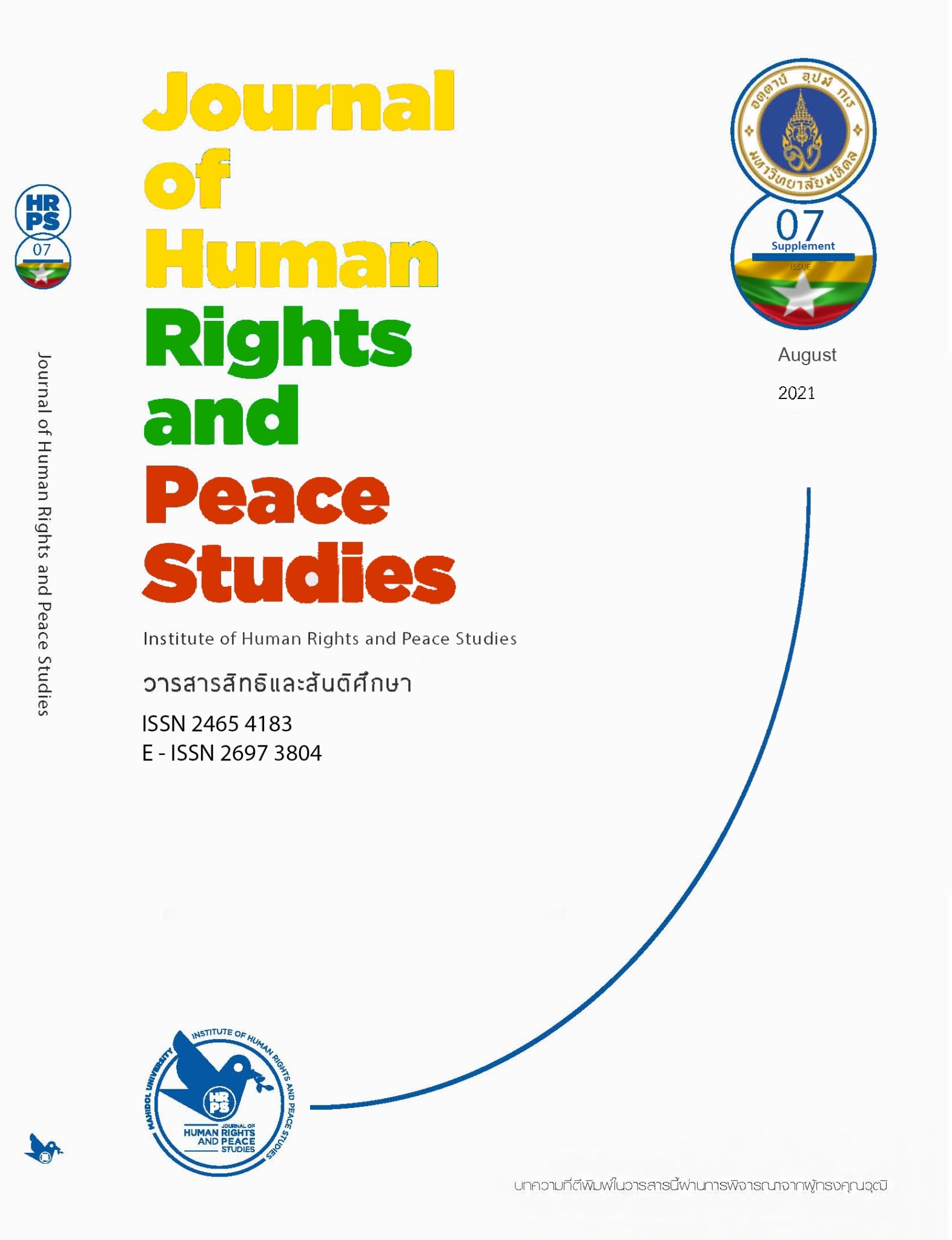Human Rights and Refusing the First Information Report in Pre-trial Process in the Criminal Justice System of Myanmar
Main Article Content
Abstract
This research focuses on how refusing the First Information Report in the pre-trial process in the Criminal Justice System of Myanmar, which has been under control of dictatorship since 1962, leads to the violation of basic human rights. The First Information Report (FIR) is the information reported by victims or persons who have witnessed or have awareness of a crime scene or criminal act by hearsay. As one of the most important legal enforcement institutions, the Myanmar Police Force (MPF) is under a legal obligation to register a FIR in order to advance an investigation, which is the primary measure to establish the rule of law. Therefore, an outright refusal to comply with this legal obligation is problematic, since it would lead not only to peoples’ distrust in the administration of justice but also to the violation of human rights. Findings of interviews showed that refusing a FIR threatens a violation of human rights such as those to a fair trial, equality before the law and non-discrimination; it weakens the principle of access to justice; and negatively impacts the rule of law.
Article Details

This work is licensed under a Creative Commons Attribution-NonCommercial-NoDerivatives 4.0 International License.
The views, opinions, and pictures expressed in this journal are those of the authors and do not necessarily reflect the opinions and viewpoints of the editor and the editorial board. All rights are reserved by the authors and the Institute of Human Rights and Peace Studies of Mahidol University. No part of this journal may be reproduced, stored in a retrieval system, or transmitted in any form or by any means without the prior permission in writing from the journal’s editor, or as expressly permitted by law, or under terms agreed with the appropriate reprographics rights organization. Non-commercial use of information in this journal must be properly referenced.
References
Code of Criminal Procedure. (Myanmar). (1898). https://www.mlis.gov.mm/lsScPop.do?lawordSn=10442
Constitution of the Republic of the Union of Myanmar. (Myanmar). (2008). http://www.myanmar-law-library.org/law-library/laws-and-regulations/constitutions/2008-constitution.html
Daly, K. (2012). Aims of the criminal justice system. In M. Marmo, W. de Lint, & D. Palmer (Eds.), Crime and justice: A guide to criminology (4th ed.) Thomson Reuters (Professional). https://www.researchgate.net/publication/29451914 _Aims_of_the_Criminal_Justice_System
Deswal, V. (2013). Burking of crimes by refusal to register FIR in cognizable offences. Journal of Indian Law Institute, 55(3), 361-375. https://www.jstor.org/stable/43953675
Farm Land Law. (Myanmar). (2012). The Pyidaungsu Hluttaw Law No. 11/ 2012. https://www.mlis.gov.mm/ mLsView.do;jsessionid=F90878E6E5E9B105DAE13F78D586FB1E?lawordSn=183
Islam, S. (2019). Role of police in the criminal justice system of Bangladesh: Need for reformation. International Journal of Management, Technology, and Social Sciences (IJMTS), 4(1), 46-51. https://doi.org/10.5281/zenodo.2654464
King Emperor v. Nga Hlaing. (Myanmar). (1928). All Indian Law Report p. 481
Law Amending Penal Code. (Myanmar). (2019). The Pyidaungsu Hluttaw Law No. 10/2019. https://www.burmalibrary.org/en/pyidaungsu-hluttaw-law-no-102019-the-penal-code-amendment-act-raajsttkiikiu-pngchngsnnyupde. (in Burmese).
Law Protecting the Privacy and Security of Citizens. (Myanmar). (2017). The Pyidaungsu Hluttaw Law No. 5/2017. https://myanmar-law-library.org/law-library/laws-and-regulations/laws/myanmar-laws-1988-until-now/national-league-for-democracy-2016/myanmar-laws-2017/pyidaungsu-hluttaw-law-noo5-2017-protection-of-the-citizen-for-the-personal.html. (in Burmese).
Manara, S. (2017). Fair trial guidebook and the Criminal Procedure Code, 1898, A commentary with recommendations.
Mg Tin Hlaing v. Union of Myanmar. (Myanmar). (1966), Burma Law Report p. 80
My Justice. (2018). Searching for justice in the law: Understanding access to justice in Myanmar: Findings from the Myanmar justice survey 2017. British Council. https://www.myjusticemyanmar.org/sites/default/files/MJS%20Report_FINAL_online.pdf
Myanmar Police Force Maintenance of Discipline Law. (Myanmar). (1995). The State Law and Order Restoration Council Law No. 4/95. https://mlis.gov.mm/mLsView.do;jsessionid=35C4B9A10A97 1FE6362329E0011F8D1F?lawordSn=7902
Myanmar Police Manual (5th Ed., Vol. 2). (1940). https://mgnyunt.files.wordpress.com/2014/10/police-manual-vol-2-en.pdf
Pring, C. (2017). People and corruption: Asia Pacific: Global corruption barometer. Transparency International. https://images.transparencycdn.org/images/2017_GCB_AsiaPacific_EN.pdf
Selth, A. (2012). Myanmar police force, coercing, continuity and change. Contemporary Southeast Asia, 34(1), 53-79. https://www.jstor.org/stable/41446244
U Ba Shwe v. Socialist republic of Myanmar. (Myanmar). (1978). Burma Law Report p. 77
U Than Htut v. In Charge of Naung Cho Police Station. (Myanmar). (2014). Myanmar Law Report p. 54
United Nations Development Programme. (2005). Programming for Justice: Access for all a practitioner’s guide to a human rights-based approach to access to justice. UNDP. https://www.un.org/ruleoflaw/files/ Justice_Guides_ProgrammingForJustice-AccessForAll.pdf
United Nations General Assembly. (1948, December 10). Universal Declaration of Human Rights (217 A (III)). https://www.ohchr.org/EN/UDHR/Documents/UDHR_Translations/eng.pdf
United Nations General Assembly. (1981, September 3). Convention on the Elimination of all forms of Discriminations against Women: Adopted and opened for signature, ratification and accession by General Assembly resolution 34/180 of 18 December 1979 entry into force 3 September 1981, in accordance with article 27(1). https://www.ohchr.org/en/professionalinterest/pages/cedaw.aspx
United Nations General Assembly. (1990, September 2). Convention on the Rights of the Child: Adopted and opened for signature, ratification and accession by General Assembly resolution 44/25 of 20 November 1989, entry into force 2 September 1990, in accordance with article 49. https://www.ohchr.org/en/professionalinterest/pages/crc.aspx
United Nations Office of the High Commissioner for Human Rights. (1976, January 3). International Covenant on Economic, Social and Cultural Rights: Adopted and opened for signature, ratification and accession by General Assembly resolution 2200A (XXI) of 16 December 1966 entry into force 3 January 1976, in accordance with article 27. https://www.ohchr.org/Documents/ProfessionalInterest/cescr.pdf
United Nations Security Council. (2004, August 23). The rule of law and transitional justice in conflict and post conflict societies (S/2004/616). https://www.un.org/ruleoflaw/files/2004%20report.pdf
Vacant, Fallow and Virgin Land Management Law. (Myanmar). (2012). The Pyidaungsu Hluttaw Law No. 10/2012. https://www.mlis.gov.mm/mLsView.do;jsessionid=F8B9BEA50995CF259F3565E9879F2562?lawordSn=185


